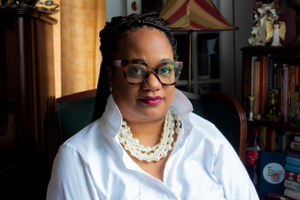Photo by Sasha Kim
A boy’s father is his first hero. Not only does the son look up to his father as his role model, but he also looks to his father for guidance. A child watches his father’s every move. He is watching when the father is aware. He is watching when the father is not aware. Sons imitate their fathers far more often than fathers wish to admit.
For children, actions speak louder than words. In schools where African American boys may show little to no interest in reading, imitation can positively affect their reading success. As America celebrates Father’s Day, concerned citizens must focus on the low literacy rates in many states. Perhaps we can follow the United Nations’ charge of finding new literacy strategies for the nation’s Black youth by encouraging Black fathers to become reading role models.
Research shows that a boy with a father as a reading role model during his early literacy years is more likely to develop the behaviors of a literate person. This fact creates a powerful charge for a father as a reading role model. Although a father promoting reading can change his son’s future, some boys lack father figures in their homes. School administrators and literacy leaders can still reap the benefits of Black male reading role models by adding African American dads to their school literacy programs. School administrators and literacy leaders can celebrate that Black male students can identify with other Black males willing to serve as reading role models.

Photo by cottonbro studio
Below are three simple ideas to get started:
- Promote the idea of community. In the book Between the World and Meby Ta-Nehisi Coates (Spiegel & Grau), Coates explores the “beautiful burden” an African American father has in educating his son. This beautiful burden is one the entire male community can shoulder. Reach out to the dads in your community to garner their support of the “reading role model” initiative.
- Invite African American dads to share their stories. A father who didn’t like reading as a young person may be reluctant to read as an adult. Invite fathers to the classroom to tell stories and share experiences. As the teacher, find books and articles that mirror the recounted experiences for the Black readers to enjoy as a follow-up to the speaker’s story.
- Survey the community: In my work as a literacy leader, I found amazing and historical figures or their relatives through surveys and conversations. For example, members of my school community included relatives of a Harlem Globetrotter, a Tuskegee airman, and a Buffalo soldier. These men shared stories passed down to them by these great men in history. As the literacy leader, I found books that dovetailed these experiences and asked the guests to read them to the class as side dishes to their stories.
- Promote literacy through short pieces. Poetry is a fun form of expression. Hold a poetry slam night and promote the likes of Gil Scott-Heron, Langston Hughes, Claude McKay, and Countee Cullen. And don’t overlook our contemporaries like Tupac Shakur and Will Smith. Men tend to be attracted to short literary pieces that pack big punches.
You can access the content for themed literacy programs on sites such as The Poetry Foundation, Poem Hunter, and All Poetry. To find the men in your community who wish to participate in your literacy program, distribute a survey, and celebrate the volunteers by promoting them on your literacy website. It doesn’t hurt to offer food, either! With a little effort, a literacy leader can fill the literacy program with dads who are eager and willing to share their stories.

Dr R. A. Slaughter’s (Doc) book Daddy, Read to Me (DREAM) and textbooks Turning the Page: The Ultimate Guide for Teachers to Multicultural Literature and Turning the Page: A Guide to Securing Multicultural Literature for Schools, both published by Rowman & Littlefield and available in all bookstores, have brought Doc global recognition. For more information, log onto DrRachelSlaughter.info or check out “The Reading Quilt” talk show every Monday at 3:30 pm on PhillyCam. To contact Dr Slaughter, log onto DrRachelSlaughter.info.





